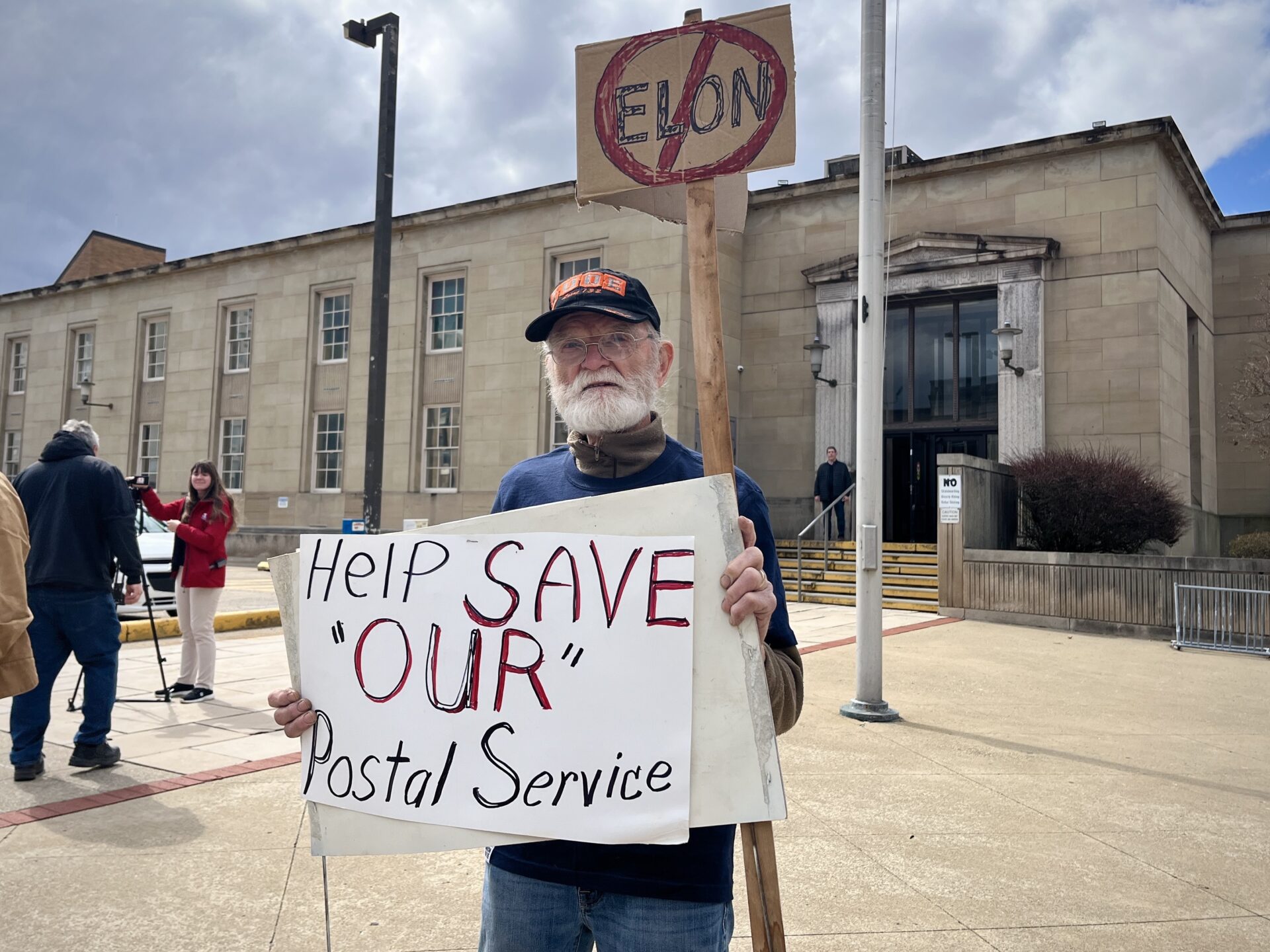Picket signs and posters in hand, dozens gathered outside Charleston’s main post office last week to sound the alarm over looming postal job cuts and a move toward privatizing domestic mail services.
For years, the United States Postal Service (USPS) has been on the financial decline, capped with a $9.5 billion net loss in fiscal year 2024. President Donald Trump has floated plans to restructure the agency, and earlier this month USPS announced it would cut 10,000 jobs nationally through a voluntary early retirement program.
But Charleston-area postal unions worry that could bring risks to harder-to-reach rural communities, including much of West Virginia.
“Do you really think that they’re going to want to deliver one piece of mail to you all the way up a holler in West Virginia, versus concentrate on the inner city and the corporations here inside the city?” said Tim Holstein, vice president of Charleston’s American Postal Workers Union Local 133.
Holstein helped organize Thursday’s rally, part of a nationwide demonstration from postal unions to raise concerns over the looming changes to the nation’s public mail service.
“It’s just a no-win for union workers,” Holstein said at the rally. “It’s a no win for West Virginia, being a rural state.”
Photo Credit: Jack Walker/West Virginia Public Broadcasting
Letter carrier Rob Lloyd — who also serves as secretary for the Charleston-area Branch 531 of the National Association of Letter Carriers — said he saw cutbacks on USPS coming, just not this fast.
“These people on Capitol Hill, they want to come after people that have good-paying jobs,” Lloyd said. “They attack labor unions. They do it all the time. You can kind of see the writing on the wall with the way things have happened. I wasn’t anticipating it being this swift and this scary.”
Like some others at the rally, Lloyd expressed particular concern over the newly launched Department of Government Efficiency (DOGE), led by entrepreneur and advisor Elon Musk. DOGE has been at the forefront of federal workforce cuts nationwide since launching under the Trump administration.
“It’s really scary, because you know that he doesn’t have any clue what we do every day — the service we provide to the American people,” Lloyd said.
Concerns like these are shared by postal workers at all levels, including management. Outgoing Charleston Postmaster David Staton said reductions to USPS come at workers’ expense, and would be a detriment to the local community.
“We just don’t want to lose any jobs here in the state that are well-paying jobs,” Staton said. “We can’t afford to lose jobs here.”
Tim Powers has worked in the postal industry for nearly three decades, and today serves as president of the Charleston-area National Postal Mail Handlers Union Local 305. But years ago he worked at a postal facility in Huntington that was shut down, forcing him to transfer to Charleston.
Photo Credit: Jack Walker/West Virginia Public Broadcasting
That was a difficult experience Powers hopes unions can shield today’s workforce from.
“I do know what it’s like to have your life interrupted already by work. At this point, this is obviously at a significantly different level [than] that,” Powers said. “Over the last few years, we’ve had to fight and make the people aware more than ever of the danger that’s facing the postal service.”
The picket line is familiar territory for Charleston’s postal workers. In 2023, local postal unions began rallying against plans to consolidate a South Charleston mail processing center, the only full processing facility in the state.
The proposal would have transferred many services and positions at the Charleston Processing and Distribution Center to a facility near Pittsburgh, but USPS ultimately changed course and left the facility’s operations in place.
If USPS is privatized or downsized, “the people are the ones that will lose their postal service and suffer the most,” Powers said. “And, of course, all of us that work here as well. Because it’ll be only the uber rich, only the billionaires [who] benefit from breaking up something and profiting off of it. Everybody else will have slower service and higher prices.”
While having to reassert his industry’s value may be tiring, Holstein said he and other union workers organize to support the postal service because of the resource it provides workers and residents alike.
“This is a kind of unique job, because not only am I doing it for my members,” Holstein said. “[But] I am also doing it for the public. We’re here to fight, and we fight to win.”
